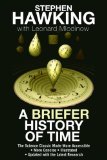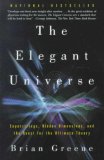Rather that going over authors that caught my attention (which after 17 posts has drained my imagination considerably) I’m going to change the format of these series and instead write about specific books I’ve recently read. This time I’m going to cover two books: “A Briefer History Of Time” by Stephen Hawking and Leonard Mlodinow, and “The Elegant Universe” by Brian Greene.
I’ve grouped these two Kindle eBooks together because I’ve read them one after another and they are complimentary to each other in many ways.

A Briefer History Of Time is an abridged and updated edition of “A Brief History Of Time” that was originally published in 1988. It was published in 2005. The book is about human percenption of time, space and cosmology and how it changed and developed over time starting as early as ancient times of Aristotle and all the way to modern superstring frontier of theoretical physics. It covers established (and some outdated) scientific theories such as Newton’s treory of gravity, Einstein’s special and general relativity, quantum mechanics etc. “A Briefer History Of Time” does a great job at popularizing these complex theories to a level understandable by most people without background in math and physics. I derived a lot of enjoyment from reading this book by recollecting how I studied this or that concept in high school and university. If you are curious about what makes the world tick the way it does I strongly recommend reading this book. “A Briefer History of Time” is published by Amazon with “Optimized for Kindle DX” badge.

The Elegant Universe, although written by another author picks up where “A Briefer History Of Time” left off. Although most of the book is dedicated to string theory, there is quite a bit of information about theory of relativity and quantum mechanics. “The Elegant Universe” describes how these two well established and verified theories are in fundamental conflict with each other and how string theory (as well as it’s variants superstring theory and M-theory) which depicts the universe as myriads of miniature strings similar to the ones you’ll find on a guitar or violin that become elementary particles by vibrating one way or the other attempts to resolve this conflict. Although “The Elegant Universe” is more technical than “A Briefer History of Time” it is still well within the realm of understanding by most people. For mathematically and scientifically savvy readers additional information is provided in appendixes. In final chapters the author really lets his imagination fly loose when touching on such subjects as multiverse. Although the books is somewhat biased (you can see that Greene really wants the string theory to come out as the Ultimate Theory of Everything) it still found it well worth reading.